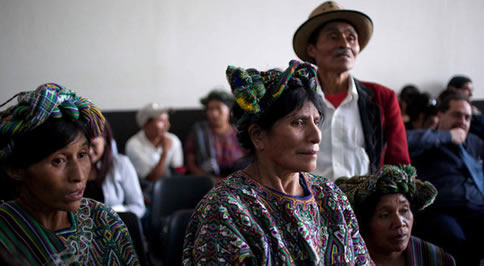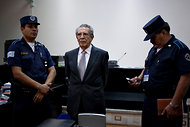Ilankai Tamil Sangam28th Year on the Web Association of Tamils of Sri Lanka in the USA |
|||||
 Home Home Archives Archives |
Accused of Atrocities, Guatemala’s Ex-Dictator Chooses Silenceby Elisabeth Malkin, The New York Times, January 27, 2012
MEXICO CITY — Efraín Ríos Montt, Guatemala’s former military dictator, was ordered by a Guatemalan judge on Thursday to stand trial on charges of genocide and crimes against humanity leveled at him. He is accused of orchestrating the razing of Indian villages decades ago during the country’s long civil war.
On Thursday, prosecutors charged Efraín Ríos Montt, center, a former dictator, with genocide and crimes against humanity. The ruling by Judge Carol Patricia Flores Blanco was a symbolic victory for the relatives of people killed in Guatemala’s 36-year civil war and for human rights groups, who have long argued that Mr. Ríos Montt was behind much of the worst wartime violence. It came at the end of a daylong hearing in which prosecutors described mass killings, torture and rape in distant mountain villages almost 30 years ago and stressed that Mr. Ríos Montt, a former general, had full command over his troops and knowledge of their actions. Nearly three hours into the prosecutors’ presentation, the judge asked Mr. Ríos Montt, now 85, if he had any response. In a firm voice, he said, “I prefer to remain silent.” The judge ordered Mr. Ríos Montt to be detained under house arrest. During the 17 months of Mr. Ríos Montt’s rule in 1982 and 1983, the military carried out a scorched-earth campaign in the Mayan highlands as soldiers hunted down bands of leftist guerrillas. Survivors have described how military units wiped out Indian villages with extraordinary brutality, killing all the women and children along with the men. Military documents of the time described the Indians as rebel collaborators. A truth commission backed by the United Nations, set up after a peace accord in 1996, found that 200,000 people were killed during the civil war, mostly by state security forces. The violence against Mayan-Ixil villages amounted to genocide because the entire population was targeted, the commission concluded. The military’s actions against those communities were at the forefront of the allegations at Thursday’s hearing, as the prosecution outlined 72 separate episodes that resulted in the deaths of at least 1,771 people. A defense lawyer, Danilo Rodríguez, argued that Mr. Ríos Montt took power as the country faced a guerrilla insurgency that had created a national crisis. “His intention was only to restore order and cooperation among the Mayan-Ixil,” Mr. Rodríguez said. He argued that Mr. Ríos Montt was not responsible for atrocities committed on the battlefield. “He did not determine the level of force that the army used,” Mr. Rodríguez said. But prosecutors argued that as commander in chief of the armed forces and de facto president, Mr. Ríos Montt was fully in charge. They cited military documents that they said called for “the extermination of subversive elements” in the region that includes the Indian communities. The prosecutors added that Mr. Ríos Montt was on the documents’ distribution list. He had “direct participation in the implementation of the plans,” a prosecutor, Manuel Vásquez, said. Outside the court, several hundred survivors and human rights activists followed the proceedings, which were broadcast through loudspeakers. They held up pictures of relatives who had been killed or had disappeared during the war. “The simple fact that all these people who have been saying that he’s responsible can see him sitting there — that in itself has value,” said Fredy Peccerelli, the executive director of the Guatemalan Forensic Anthropological Foundation. The group, which has exhumed the remains of almost 6,000 victims of the war and has taken testimony from witnesses, has provided evidence to the prosecution. Survivors’ groups have tried to bring Mr. Ríos Montt and other members of the high command to trial for more than a decade, but the cases stalled in Guatemala’s weak judicial system. In addition, Mr. Ríos Montt claimed immunity from prosecution as a legislator. That immunity expired when his term ended on Jan. 14. Victoria Sanford, an anthropology professor at the City University of New York who has written about the violence in the 1980s, said the charges against Mr. Ríos Montt had “a very practical and real outcome in terms of dismantling the impunity that exists today.” The hearing came just days into the new presidency of another retired general, Otto Pérez Molina, who has promised to support Ms. Paz y Paz’s efforts. Mr. Pérez Molina has said that he is seeking United States military support to fight drug traffickers. But Washington has demanded that Guatemala prosecute human rights violations as a condition for receiving military aid, said Maureen Meyer of the Washington Office on Latin America, a human rights group. Nicholas Wirtz contributed reporting from Guatemala City.
| ||||
 Rodrigo Abd/Associated Press
Rodrigo Abd/Associated Press